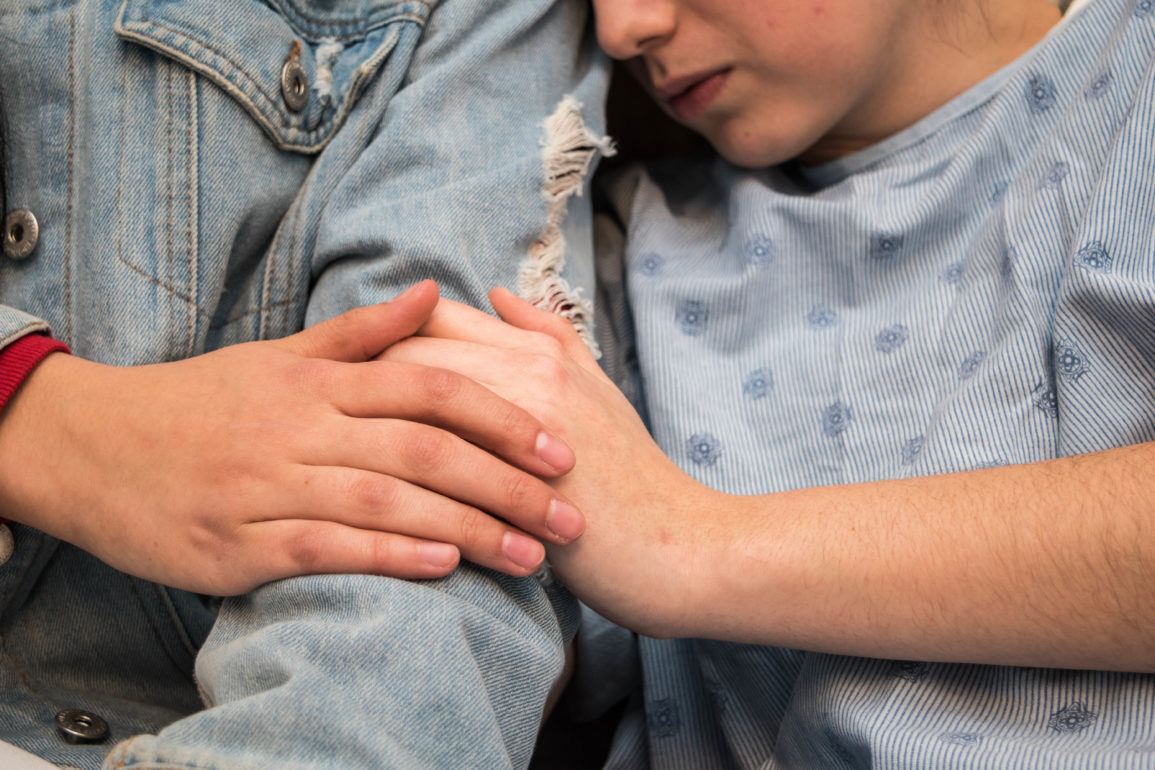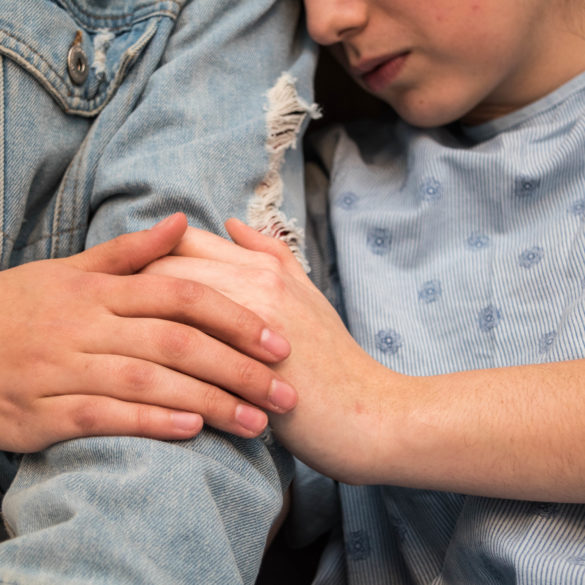The limitations that come with chronic illness can sometimes drive away friends who don’t understand, while unifying people with shared experiences.
On a chilly day last October, Sam Smith ran in the Hartford Marathon Charity 5k—her first road race. She was sporting a bright orange and cobalt blue tank to show she was running with the National Organization for Rare Disorders. She crossed the finish line, accomplishing a goal she set three years prior. She took photos with her friends, new and old, celebrating a landmark of her journey. One of Sam’s friends who has hypoparathyroidism came to show her support, standing in the rainy day. Sam called her doctor to thank him for his care.
A year ago, Sam had told her doctor she wanted to be able to run again. She picked an unobtrusive feeding tube so she could get enough nutrients to train for a 5k. Sam has gastroparesis, lupus, Type 1 diabetes, and hypoparathyroidism. These conditions have limited her, physically and socially. In the course of five years, Sam has lost friends but also gained new ones who can relate to her ailments.
Sam was pushing herself during a workout class in January 2013 when she noticed her heart was beating rapidly. She endured the rest of the class, but her heart couldn’t get into rhythm. Sam went to the emergency room and was told she had Graves’ Disease, a disorder that causes an excess in thyroid hormones, resulting in heart palpitations and fatigue. Eight months after this diagnosis, her thyroid was removed, but complications set in. This began a series of other diagnoses over the next year.
Chronic illness affects 60 percent of Americans, according to a 2017 study by RAND Corporation, and 28 percent of those have three or more chronic illnesses. RAND describes chronic illness as an ailment that causes restrictions for more than one year. This includes conditions like high cholesterol, asthma, and generalized anxiety disorder. The type, severity, and number of conditions changes each person’s experience.
As chronic illness can affect self-perception, mental illness can often be a problem for those with long-term physical conditions. Support from friends can improve quality of life, but this support can be hard for many friends to maintain. So patients seek common ground on websites like The Mighty, an online community for those with health challenges, and other support settings.
Sam didn’t have a crazy social life in her early twenties. She would go out for drinks and eat out with friends. She had plenty of people to hang out with, and she stayed active. Now at 28, friends don’t ask her out to eat. Her diet is strict, and she can’t drink alcohol anymore.
Sam had a lot of friendships end as her health worsened. Her best friend stayed, trying to understand the illnesses. They don’t talk as often as they used to, but she’s always there when Sam needs her to be. She still invites Sam out, even if she doesn’t know whether Sam can go.
When Sam got diagnosed with gastroparesis, a disorder that slows digestion, she took to Google. Avoiding WebMD, she clicked on a link to a non-profit called G-Pact, Gastroparesis Patient Association for Cures and Treatment, Inc. The homepage mentioned support groups on social media, so she joined a Facebook group.
When Sam needed to get a feeding tube, she asked the group for advice. She didn’t know what to expect, and her doctors couldn’t provide the practical knowledge of lived experience. Sam connected with a few commenters and got to know a woman who sends care packages to people new to feeding tubes. She didn’t know so many accessories would go along with the medical device.
Through G-Pact’s Facebook groups, as well as a hypoparathyroidism group, Sam has made a circle of friends with chronic illnesses. They talk daily even though they’re miles away. Right now, one of Sam’s friends is on crutches, and Sam herself just recently got off them. They joked about being clumsy or limping around. Sam says it’s easier to share stories when the other person has the same background.
“Gastroparesis may have brought us together,” she says, “but our friendships became so much more than that.”
The encouragement Sam has received inspires her to support others. She runs a personal blog, Hustle and Heart, and posts for G-Pact’s website. She also counsels others as part of G-Pact’s board and as a certified coach.
Sam celebrated this New Year’s Eve out with her new friends. It wasn’t weird that she wasn’t drinking, and she felt like part of the party. A year before, she had been sick on her couch, so she was glad to get to see the ball drop in the company of friends.
A December 2017 study aimed at helping friends and family assist chronic illness sufferers showed confusion among supporters of patients. More than 40 percent of supporters said they didn’t know enough about the health conditions to be helpful, and more than 25 percent felt overwhelmed.
Carol Head had friends who didn’t believe her when she got sick right as she finished graduate school. Like Sam, she had to adjust to a sudden change in health. She got the flu, but a few symptoms stayed: exhaustion, migraines, and sore throats. Carol was bed-bound for years before she went back to work. When she returned, she didn’t have energy to do anything but rest at the end of her shifts. She has Myalgic Encephalomyelitis, also known as Chronic Fatigue Syndrome (ME/CFS), an illness without a known cause or cure. It leads to extreme fatigue, aches, and cognitive issues.
Now, Carol serves as president and CEO of The Solve ME/CFS Initiative, a non-profit organization that aims to find treatments and raise awareness for the disease.
ME/CFS causes 86 percent of sufferers to cut down on social life, and 27 percent are bedridden, according to a 2011 report sponsored by the National Institute of Health’s Office of Research on Women’s Health. Intensity of fatigue varies, and it affects patients’ lives differently. Some sufferers can’t keep up with their family or job. “Life’s pleasures, including friends, fell away,” Carol says.
ME/CFS is invisible, meaning others can’t see the symptoms patients experience. It is common for sufferers to get called hypochondriacs—unable to differentiate sickness from health. Others get written off as simply lazy. It’s a difficult disease to understand, so friends often can’t grasp the realities of ME/CFS, Carol says. You don’t look tired, friends would say. Just give it your best, and you’ll be fine. I’ve been tired, too.
Today, Carol says she is 90 percent recovered, and her husband was one of the few who stayed close to her during the hard years. He knew she wasn’t exaggerating the illness. She first fell ill during their relationship, and he proposed when chances of recovery seemed slim. Carol told him it would be difficult, and she asked him to consider if he could commit. He did, and he cheered her on when no one else believed her illness was real.





